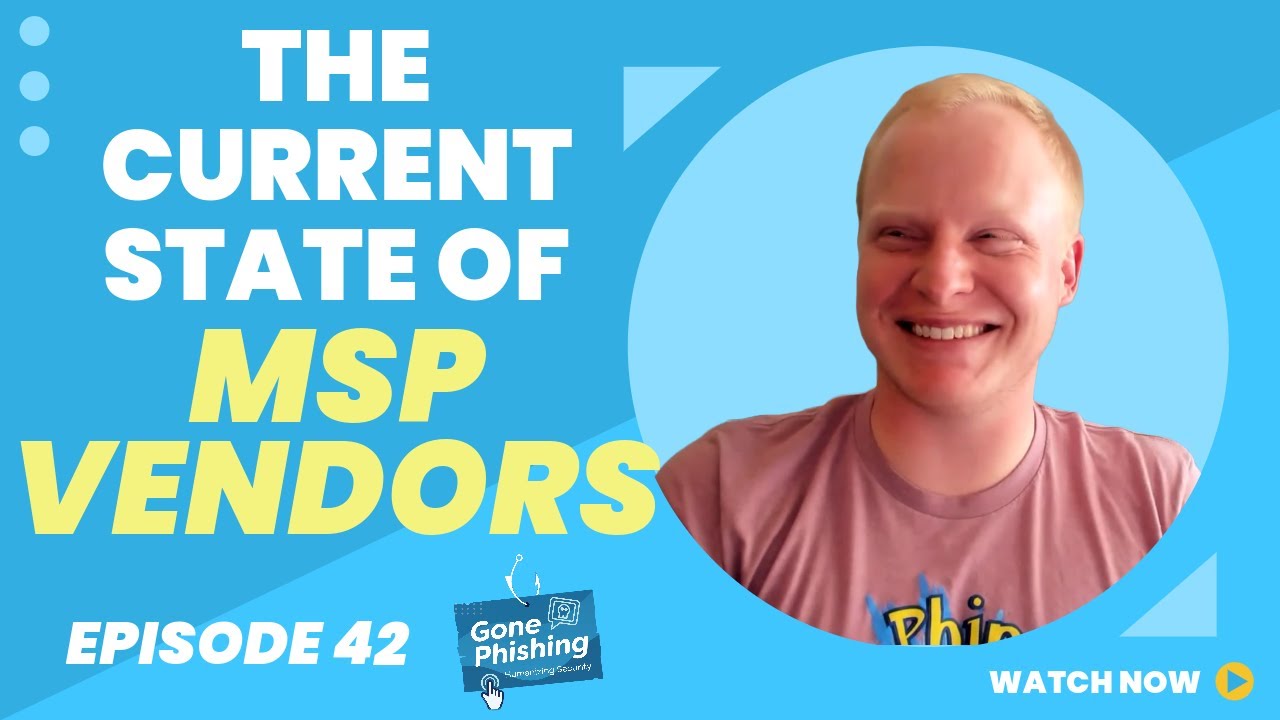


Transcript:
Connor Swalm
Welcome to Gone Phishing, a show diving into the cybersecurity threats that surround our highly connected lives. Every human is different. Every person has unique vulnerabilities that expose them to potentially successful social engineering. On this show, we'll discuss human vulnerability and how it relates to unique individuals. I'm Connor Swam, CEO of Phin Security, and welcome to Gone Phishing.
Hey, everyone. Welcome back. I am Connor Swan, the CEO of Phin Security and the host of the Gone Phishing podcast. And I am joined once again by one of my best friends, Raymond Orcini.
I called you Raymond, I think.
Raymond Orsini
I don't know if anyone else called.
Am I in trouble? That's what my mom used to do. She'd like Raymond Gregory Orsini, Jr. And.
Then I knew he was in trouble.
Connor Swalm
So in our last show, we talked about what's kind of the state of, in your mind, the MSP industry. You've been a part of it for much longer than I have. At least you've found an MSP. You know it serves MSPs. Mmmn reports on MSPs. So if one person knows something about MSPs, it's probably Tom Lawrence. But I'll also put you guaranteed.
Raymond Orsini
Okay, I appreciate that. I was going to say it's legal, but yeah Okay. Wasn't Tom Lawrence one of your previous episodes?
Connor Swalm
He was, and he'll probably be on many more episodes because I love chatting with him.
Raymond Orsini
He's a good guy.
Connor Swalm
He's a great guy. So, a concept that was brand new to me when I started in this industry was how important community is to MSPs, how important it needs to be. For the vendors and the partners that they work with, and even, to an extent, to their clients. So a question that I have that I pose to a bunch of folks is, what separates the bad from the good, the out-of-touch from the in-touch vendors in regards to their concept of community and how they treat it? What's your perspective on?
Raymond Orsini
So, yeah, as our good friend Segal likes to say, I have opinions on, and I apologize if you watch the last episode because now it'll sound like name-dropping. But I am a moderator of our MSP, largest MSP community on the planet and I actively participate in probably every single other one, too. The Facebook groups, MSP, iT, pool party, MRU. And the reason I say that is because, to me, community is everything. My LinkedIn profile even says champion for. Msps, because the community is what allows that to happen. It increases transparency. I think some of the problem with some of the vendors is, or the opportunity for improvement. As I like to say, the opportunity is that a lot of vendors look. At community as just another marketing channel, right? How many look at social media as a marketing channel? How many look at webinars as a marketing channel versus conversations that you are? You're actually getting to know people and addressing serious concerns, but you're also a very active and supportive member of the MSP community, so. Right. That's the contrast to those people that look at this stuff as marketing channels. And those that do it. They come in, and I'm not saying they can't be successful they can. There's companies that are built on that. But the companies that come in from day one and really mean to be part of the community and serving the communities first. Serving their companies second. As crazy as that sounds, especially for two CEOs like us, right, like we should 100% be focused on our companies. But you and I are very much. I mean, we're talking to this guy that was going to bed the other day, wanted to check on his Phin trial, right?
Connor Swalm
We were talking.
Raymond Orsini
And so it's so important to be focused on the community because in the end, it comes back to you. And you're not doing it because it comes back to you. You're doing it because it's a worthwhile thing to support MSPs, educate them, be there for them, connect them when they need to. As vendors, we get a nice eagle eye view of the entire landscape. Right. Like you have MSPs across the know. Same with me. So that when an MSP comes to me and says, I need somebody in West Virginia, I need somebody in Nevada, I need somebody in Australia. Yes, I realize states versus country, don't yell at, you know, when they come to me, chances are I either know somebody that's a partner of mine or I know somebody in the community that I can connect them with. I just did that yesterday. I connected an MSP with one of my voice clients that didn't have an MSP, and I was like, here, have fun. Get to know each other. Yeah. And so vendors that work that way grow, right?
We've seen it. We've seen yourself. I'm not going to call it any other names, but we've seen the vendors that do it. We've seen the vendors that started huge on community. There was a vendor that I started using in 2011, 2012, specifically because I said, if their support sucks, I at. Least know there's a giant community I can go ask questions on and they'll. Give me the information. And that was a giant part of why I went with that software product. They also had amazing forums at the time and videos that focused a lot. On education, so it was a win.
Now, mind you, this is 2011. Nowadays, I'm sure JB's in the background. Yeah, we need videos. No kidding. Like all of us, we know this. These are table stakes, right back to our previous episode. But in 2011, that wasn't the norm. We didn't have people focused on YouTube channels and whatever, but this vendor had it. And then, I'm specifically not calling out the name, but as years progressed, they weren't as involved as heavily in the community. Their forums had shut down or gone stagnant. They had one or two forays in the community, but it wasn't the hard.
Connor Swalm
Press it used to.
Raymond Orsini
And their view in the community changed significantly. Msps noticed it. And to not say that's the end of the world, the same vendor in the last couple, last three years has reinvigorated their focus on the community and it has improved versus their competitors. And it shows you don't have to be the best, you don't have to be great. You just have to be in the conversation. So if you're in the conversation, listen. Connor, your friend, if I screw up something, you're more likely to have a conversation, be understanding with me, than if I was just a vendor or it was just a transactional relationship.
Connor Swalm
Well, the reality is I know so. Many of your employees that actually, I just call them and complain about you and then we end up talking.
Raymond Orsini
True story. Then I'm one of my own live streams and then suddenly the audio dubbing gets off. For some reason, AI Ray takes over.
Connor Swalm
And starts saying embarrassing things.
Raymond Orsini
Am I wearing pants? No. But those vendors that take advantage of the community, it's a big deal and they reap the rewards and it definitely gives them better. I'm not going to pretend we've never had issues with my own companies. You know what I mean? Of course, we have. But when you have the conversation and you're transparent in those communities, don't just look at as pr, but if I screwed up and something that affected you. As a friend, I'd come to you and say, look, Connor, I screwed up. I'm sorry. This is what happened. Give you a heads-up. The vendors that do that in the communities are so much size that they're loved, they have so much better interaction. Better client adoption, better spread across the MSP base, the 40, 50, 70,000 MSPs. In the US, depending on who you ask. There's so much opportunity. You just need to be part of the conversation, become a friend.
Connor Swalm
Why do you think the MSP industry. Kind of, I'll use the term, evolved that way? Why is it kind of necessary that community is such a huge piece of the culture and the industry as a whole?
Raymond Orsini
Because stereotypes are funny. And as per usual, it's half the conversation. So your mom or your uncle or whatever starts talking. You meet somebody at the bar, and you say, I'm in it. And they picture some dude eating Cheetos, flaming hot, drinking code red in a dark closet, maybe with a uv light.
Connor Swalm
Maybe playing war zone. Who knows?
Raymond Orsini
Maybe playing war zone, you know what I mean? But, like, at three in the morning, that's the epitome of the it guy in the view of most people, right? You see this in Hollywood all the time. Some socially awkward person that doesn't know. How to engage, doesn't know how to communicate. And while a good majority of MSPs. And its providers do identify as introverts, absolutely. The truth of the matter is, I think the MSP world has evolved to understand we can be alone, but also together, right? Being in these communities, some people like in person, you and I go to conferences, and we enjoy the hell out. Of them, but you know exactly how exhausting they can be sometimes. And even though you're having fun, it's no different than going to the beach. You have a blast, and when you. Get home, you're exhausted. But some people like those in-person interactions. Some people like the online forum interactions, right? Tom Lawrence's forums, MSP geeks forums, Reddit, Spiceworks. And then there's some that just like online real-time communication, right? The MSP geeks, the Mrus, it pool parties, Facebook groups. But the thing is, regardless, across this giant swath, MSPs value interacting with others so they don't feel alone. They don't always outwardly show that they. Don't want to be alone. But the truth of the matter is, nobody wants to be alone. Even in my darkest days, where I'm frustrated with everybody, like, I need a bourbon, I still enjoy going home and knowing my wife's available. Like, should I go want to have a conversation? And community allows that. It makes your friends are there whenever you need and I think that's been a huge benefit for MSPs, more so than many other communities I'm part of that makes.
Connor Swalm
A lot of sense. One thing that I've always thought is if you look at the relationship that. Most MSPs have with their clients, right? How intimate of a relationship is that? So if you have a small business that is getting all of their it, their infrastructure, their security services, through one. Relationship, which is how MSPs typically work. You're essentially entrusting not only your current business but your future business. Your ability to grow, your ability to skip, your ability to not be a victim of a cyberattack, or to at least not have it end your business is completely in the hands of this one provider. And the seriousness with which that relationship has to be held is. I've always viewed that as. That's also how MSPs treat their vendors. As a result, it's like, well, if this is how much my client trusts me, this is how much I need to trust the tools that I'm using to serve them.
Raymond Orsini
Yeah, absolutely. No, and it's absolutely true. The liability has gone up significantly for MSPs because like you talked about in the previous episode where maybe their password manager was breached, and we're all saying you need to use nameless password manager. It's called Phinpass. No, I'm kidding.
Connor Swalm
I'm kidding. Don't get my dev team all riled up like that. Right? They're going to think we released it.
Raymond Orsini
Super easy.
Connor Swalm
Yeah, super easy.
Raymond Orsini
Yeah. I can already see Josh chasing me. But my thing is, we're the ones telling the vendors, this is the counterpoint to that other conversation we're having, the last episode where bringing these solutions down so they're table sakes. You wouldn't question if you're using antivirus. You wouldn't question if they're using email. These are just basal things. Well, so does security awareness training, so is MFA, so are password managers. But to be able to do that where the client trusts you of, hey Connor, whatever you say, I'm going to use. I got you. You got my card. Let's do it. That requires an infinite amount of trust in the MSP. And the MSP better do their due diligence. And due diligence is hard with vendors. It's really hard because not everybody is transparent. Not everybody puts the stuff out there, will answer the questions when you ask or understand where you're coming from. And even if they can't say yes to the question you're asking, they may be able to provide an alternate solution. Or at least a reasoning why very few of the vendors do this. But here's a secret. The vendors that do that are usually in the community because they're already having the conversations and the benefit of the community. You may have one MSP ask a question, say, does Phin do this and the other MSP would have said, well that's actually a good question. I actually wouldn't have thought of that but I need that, too. Get that value where it's hard to do anywhere else.
Connor Swalm
Yeah, it is. Where do you see companies take their first misstep in regards to community? What's kind of a glaringly obvious, if somebody's listening to this, like, damn, I Want to get involved in communities, don't Want to do it incorrectly. What would be your thought?
Raymond Orsini
So one of my favorite sayings, you have two ears and one mouth for a reason. Supposed to listen twice as much as you talk. If you walk into a room .ost of us, maybe you and me are the wrong examples for this, but most people would not walk in a room and just start talking, right? Most people would listen, take the temperature, see who's involved, see who's there, see who they recognize. They wouldn't just walk in and start talking. With online communities, it's very easy to just join a server. Hey, guys, blah. And start talking. I'm Mike from XYZ, MSP vendor company. And you guys can use us through this and you can buy us right away and you get two free months. Homie, I don't want to hear your sales pitch if I don't even know your name. You know what I mean? If I've never met you before let's establish a relationship because anybody that understands sales knows you have to establish relationship, right? Identify the client, get past the gatekeeper, determine the pain points, establish rapport, develop a solution, close the deal, go to. Our objections, close the deal, blah. We've all heard this in one of the 14 billion sales books, but you have to have the relationship. And if you're sitting there walking in. Just yelling your stuff, you're that guy that's spinning the cardboard on the street corner, that's spinning the sign. While it's cool to watch for a little bit, you're not going to get into a two hour conversation with that, right. And you're probably going to question it. Unless it's some retail good, you're probably not going to buy a service from them because that's the wrong avenue. Right. That's cool, but it's the wrong avenue. Well, same thing here. If you just walk in and start.
Connor Swalm
Talking, you're not going to be successful.
Raymond Orsini
You walk in and listen and then genuinely try to be part of the conversation. So it's not about you, it's about everybody. Then you can succeed.
Connor Swalm
There's two things I've always thought is to piggyback on your statement. People buy from people they like, and if somebody else, if the community likes a vendor, you're fighting an uphill battle if you're not also there, and if you're not also liked. So why would anyone look in your direction if they already like a bunch of people who do what you do? The answer is they're not. And the second thing is, the crux of marketing and growth and sales is I want to track everything. I want to know, we spent a dollar here. How many dollars did it come back with? And in my experience, it is impossible so far to track the value of your investment in community, whether that's you're having your employees or you're investing your time or you're investing resources like conferences. Now, conferences are way easier to track because it's like, all right, we met these people at the conference. How many ended up being clients in.
Raymond Orsini
Tracking the Discord name versus the Reddit name versus the Facebook.
Connor Swalm
Versus the seven burner Accounts? You know that they.
Raymond Orsini
Absolutely. Yeah, absolutely. You should talk to Ashley Cooper about that. One Day she called Orbit, and she's amazing at aggregating community Data to use it for the betterment of the community. Definitely be worth having on an episode like this.
Connor Swalm
The real Ashley Cooper.
Raymond Orsini
The Real one.
Connor Swalm
Yeah, and that's where I see a lot of people. They're like, all right, how long is this going to take to ROI? Okay, well, first off, it is very hard to figure out when this isvgoing to ROI or if it ROIs. Second, there are nearly free ways to get involved with the community to start today and what you don't want to hear is that it's going to take you a year. It's going to take you two years to make friends. Why does it take that long? Have you ever made a friend? How long does it take you to have a great relationship with somebody?
Raymond Orsini
Well, if it's like you and me, it was instant.
Connor Swalm
Yeah, you had bourbon and I had a mouth and I could drink.
Raymond Orsini
And that's how that, you know, one tequila, two tequila. No, it know, match made in heaven.
Connor Swalm
I've never heard that bedtime story. One tequila, two tequila.
Raymond Orsini
The orcini household is a little different than most, but, no, I agree with you 100%. I'm lost. I'm sorry.
On that note, we could pull ourselves out of this. So if you were listening today, community.
Connor Swalm
Is not only incredibly important for msps, it needs to be important for the vendors, if not for transparency, just to build relationships if you're not there and well liked. I guarantee somebody else is. And that's probably who they're going to end up trying to work with because people buy from people they like.
Raymond Orsini
True story.
Connor Swalm
Sweet. Well, thanks so much for joining me today, Ray. I will absolutely have to have you back on. You're a blast to talk with. I don't care what Simon says about you. I am Connor, the host of Gone Phishing, a CEO of Phin security. I was joined by Ray, co founder, CEO of OIT and EMSP Media Network.
Raymond Orsini
We'll see you around later, guys.
Connor Swalm
Thanks so much for tuning in to Gone Phishing. If you want to find out more about high-quality security awareness training campaigns, how to launch them in ways that actually engage employees to change their habits, then check us out. Phin security at phinsec.io. That's P-H-I-N-S-E-C IO. Or click all of the wonderful links in our show notes. Thanks for phishing with me today and we'll see you next time.






